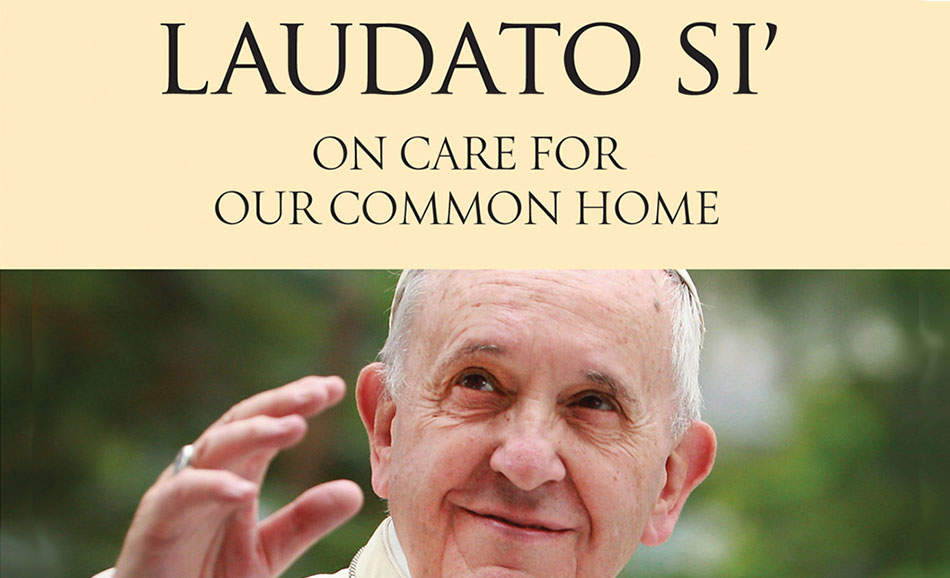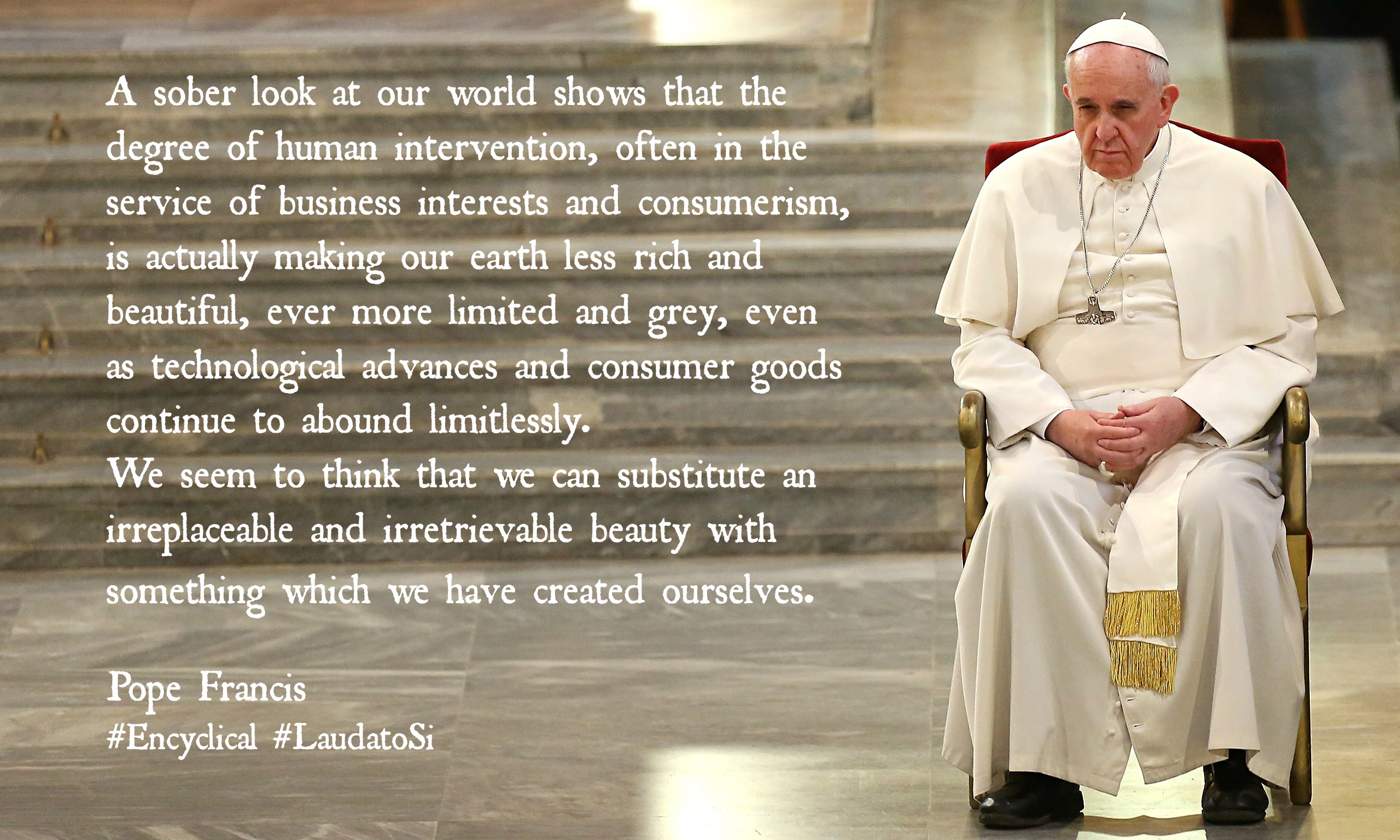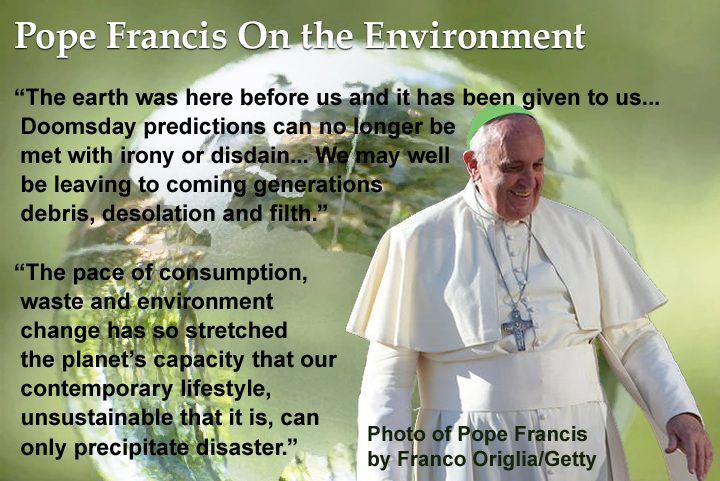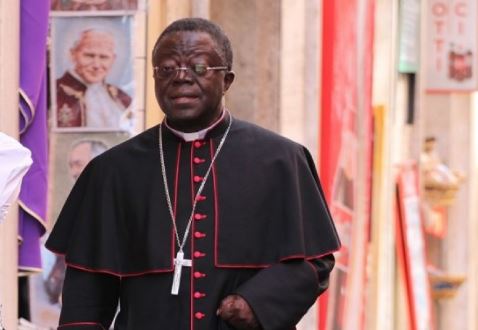The Eucharist And Our Care Of The Environment – Rev. Fr. John Louis
The topic for our discussion is “The Eucharist and our Care of the Environment”. Permit me to begin this presentation with a few teasers.
We (Catholics in Ghana) still import the wine we use for the Mass or Eucharistic celebration because we do not grow the grapes here. But can you imagine that if we continue to degrade our environment, there will come a time when we have to import not only the wine but the water that has to be mixed with it? Already now, many priests in Ghana carry bottles of water for kilometers to celebrate Masses in certain villages and towns. Should this be the case in the 21st century?
Again, when (at Mass) we confess what we have done and what we have failed to do, do we include crimes against the environment?
And, does one’s extension of a sign of peace to fellow parishioners have any meaning if he has destroyed their farms and badly impacted on their health through his illegal mining activities?
Brothers and Sisters in Christ, the above instances indicate that there is a close connection between the Eucharist and our care of the environment. Now, conscious of the fact that Pope Francis, in his Encyclical letter, Laudato si (2015),[1] provides us with a detailed theological elaboration on God’s injunction on all humans to care for the environment, this presentation focuses mainly on the Eucharist as a source and summit for our care of the environment. This approach is inspired by the Second Vatican Council’s document on the Sacred Liturgy which states that the Liturgy is the source and summit of the Church’s activity (Sacrosanctum concilium no. 10).
OUTLINE
- Definition of terms
- Eucharist as a source for care of the environment
- Eucharist as a summit for care of the environment
- The environment at Mass
- Conclusion
I see three key terms in this topic. They are: “Eucharist”, “care” and “environment”. Previous speakers have touched on the meaning of the Eucharist, so in this presentation I will consider the definitions of the two remaining terms: “care” and “environment”.
1.1 CARE
The care of/for something entails protecting it, providing for its needs, giving it attention and/or showing concern. Here, therefore, we wish to look at showing concern for or protecting the environment, or how to provide for its sustainability.
Moreover, as Christians, and specifically as Catholics, we see the care for the environment as a duty which the Creator God has entrusted to us (cf. Gen. 1:26-30). He who created and declared everything to be good and the totality of creation to be very good could not have entrusted us with a role that destroys his creation. Care of the environment should, therefore, necessary enhance the environment while enriching us.
What, then, is the environment?
1.2 ENVIRONMENT
The online Oxford Dictionaries provide us with the following two definitions:
- 1. the surroundings or conditions in which a person, animal, or plant lives or operates. (synonyms: habitat, territory, domain, surroundings, environs, etc.)
- 2. the natural world, as a whole or in a particular geographical area, especially as affected by human activity.
(synonyms: the natural world, nature, the earth, the planet, the ecosystem, etc.)
It is quite clear from the first definition that humans are not the only stakeholders of the environment; for there are also animals and plants.
Moreover, beyond this definition, Catholic Social Teaching makes us understand that the environment itself does not exist merely for use by these stakeholders, particularly, by humans; for the environment has its intrinsic usefulness: “Our insistence that each human being is an image of God should not make us overlook the fact that each creature has its own purpose. None is superfluous. The entire material universe speaks of God’s love, his boundless affection for us.” (LS 84).
This, therefore, calls for a critical look at the second part of the second definition (above): “the natural world … especially as affected by human activity”. If the verb “affected” means the way humans use or exploit the natural world, then there is a deficiency in the definition.
As an entity which has its own intrinsic usefulness, the environment could be better understood in terms of how all stakeholders, especially humans, relate to it in accordance with God’s plan of creation. Thus, Pope Francis, rightly explains that the environment “is a relationship existing between nature and the society which lives in it. Nature cannot be regarded as something separate from ourselves or as a mere setting in which we live. We are part of nature, included in it and thus in constant interaction with it” (LS 139).
Indeed, the whole of creation (humans, animals, plants as well as the environment individually and collectively) relate to the Creator. This has been beautifully captured by Psalm 148 and the Canticle of Daniel (Dan. 3:57-88). Permit me to cite Psalm 148 here:
Praise the Lord from the heavens;
praise him in the heights above.
2 Praise him, all his angels;
praise him, all his heavenly hosts.
3 Praise him, sun and moon;
praise him, all you shining stars.
4 Praise him, you highest heavens
and you waters above the skies.
5 Let them praise the name of the Lord,
for at his command they were created,
6 and he established them for ever and ever—
he issued a decree that will never pass away.
7 Praise the Lord from the earth,
you great sea creatures and all ocean depths,
8 lightning and hail, snow and clouds,
stormy winds that do his bidding,
9 you mountains and all hills,
fruit trees and all cedars,
10 wild animals and all cattle,
small creatures and flying birds,
11 kings of the earth and all nations,
you princes and all rulers on earth,
12 young men and women,
old men and children.
13 Let them praise the name of the Lord,
for his name alone is exalted;
his splendor is above the earth and the heavens.
14 And he has raised up for his people a horn,
the praise of all his faithful servants,
of Israel, the people close to his heart.
Praise the Lord.
It should be clear from the above Psalm that not only humans praise God but all other creatures in their own rights do so. In other words, other creatures also relate to God in their own ways as willed or designed by God. If, then, all elements of environment relate to God, we (humans) should have a harmonious relationship with them individually and collectively.
In view of the harmonious relationship, the environment could be referred to as our common home (LS 3, 13, passim). Thus, a prophet of old wrote:
The Lord created the heavens ….
He formed and made the earth—
he made it firm and lasting.
He did not make it a desolate waste,
but a place for people to live (Isaiah 45:18, GNT).
2.0 EUCHARIST AS A SOURCE FOR CARE OF THE ENVIRONMENT
By referring to the Eucharist as a source for our care for the environment, we mean that it enlightens us about the Creator’s design for the environment and motivates us to take good care of it. Thus, Pope Francis explains: “the Eucharist is … a source of light and motivation for our concerns for the environment, directing us to be stewards of all creation” (LS 236).
The prayers of the priest over the bread and wine at the beginning of the liturgy of the Eucharist sum up the fact that the Eucharist is a source for our care of the environment:
Blessed are you, Lord God of all creation, for through your goodness we have received the bread we offer you: fruit of the earth and work of human hands, it will become for us the bread of life. … Blessed are you, Lord God of all creation, for through your goodness we have received the wine we offer you: fruit of the vine and work of human hands, it will become our spiritual drink.[2]
In the first place, as a celebration of the Christ’s sacrifice for our redemption, the Eucharist necessarily touches on God’s creation. Hence, in the above prayer, there is the acknowledgement of God as the Creator: “God of all creation”. Every celebration of the Mass should, therefore, take our minds and hearts back to the records in the first two chapters of the Book of Genesis: God is the Maker and Master of all creation; and He has assigned us the role of caretakers or stewards. It is in playing well our role as caretakers or stewards that the environment enjoys its good care. Thus, every true participation in the Mass is a call to care for the environment.
Secondly, Christ’s redemption impacts on the whole of creation as well. Thus, St. Paul writes: “creation itself will be set free from its bondage to decay and will obtain the freedom of the glory of the children of God. We know that the whole creation has been groaning in labor pains until now; and not only the creation, but we ourselves, who have the first fruits of the Spirit, groan inwardly while we wait for adoption, the redemption of our bodies” (Rom. 8:21-23, NRSV; cf. LS 2). How, then, can those who participate in the celebration of the mystery of redemption destroy what Christ is redeeming? On the contrary, every participation in the Eucharist should motivate us to work towards the “redemption” of the degraded environment.
Another reason for perceiving the Eucharist as a source of our care for the environment could be deciphered from the fact that the Eucharistic celebration takes on a special solemnity on Sundays. Thus, Pope Francis writes:
On Sunday, our participation in the Eucharist has special importance. Sunday, like the Jewish Sabbath, is meant to be a day which heals our relationships with God, with ourselves, with others and with the world. Sunday is the day of the Resurrection, the “first day” of the new creation, whose first fruits are the Lord’s risen humanity, the pledge of the final transfiguration of all created reality. It also proclaims “man’s eternal rest in God” (LS 237).
This should constantly remind or inspire us to ensure, as far as it is within human capacity, that other elements of God’s creation enjoy the rest or respite which they require for their natural rejuvenation or restoration.
Furthermore, one could say that it is only when we are engaged in restoring “goodness” to whatever God created and declared as “good” that our response (“Blessed be God forever”) to the prayer of the priest becomes truly a praise of God. Otherwise, we are offering the Lord a mere lip service – something which displeases him:
The Lord says: “These people come near to me with their mouth
and honor me with their lips,
but their hearts are far from me.
Their worship of me
is based on merely human rules they have been taught” (Isa. 29:13, NIV; cf. Mark 7:6; Matt. 15:7-8).
3.0 EUCHARIST AS A SUMMIT FOR CARE OF THE ENVIRONMENT
As mentioned already, the Eucharist is not only a source but also a summit for the care for the environment. In other words, while the Eucharist motivates us to take a good care of the environment, a good care of the environment (in turn) leads to a meaningful celebration of the Mass. On the contrary, an extreme destruction of the environment ultimate means no Mass can be celebrated.
Once again, let us refer to priest’s prayer over the bread and wine for further explanation: “Blessed are you, Lord God of all creation, for through your goodness we have received the bread we offer you: fruit of the earth and work of human hands, it will become for us the bread of life. …” Thus, the very close connection between the Eucharist and the environment could be seen in the fact that no Mass can be celebrated without bread, which in turn is the fruit of the earth.
When human hands toil to till the earth and turn wheat into bread, human minds and hearts should ensure that the whole process respects the earth without which this essential element of the Mass cannot be produced. Centuries ago, the turning of wheat into flour was done mainly by a manual grinding. That process hardly impacted negatively on the environment. Today, generally, the commercial scale of the production of flour makes use of electricity power, whose generation (especially by gas or thermal plant) impacts negatively on the environment. Furthermore, the making of bread out of the flour sometimes makes use of forms of energy or fuels which impact negatively on the environment.
Furthermore, taking the chalice, the priest prayers: “…through your goodness we have received the wine we offer you: fruit of the vine and work of human hands, it will become our spiritual drink.” Here again, the very close connection between the Eucharist and the environment could be seen in the fact that no Mass can be celebrated without wine, which in turn is the fruit of the vine.
When human hands toil to till the earth and to turn grapes into wine, human minds and hearts should ensure that the whole process respects the earth without which this essential element of the Mass cannot be produced. Centuries ago, turning grapes into wine was done mainly by a manual crashing process and a natural fermentation process. Those processes hardly impacted negatively on the environment. Today, generally, the commercial scale of the production of wine makes use of electricity power, whose generation (especially by gas or thermal plant) impacts negatively on the environment.
Thus, while normally the celebration of the Mass itself has no negative impact on the environment, the processes of the production of the bread and wine may impact on the environment. On the other hand, the acknowledgement of God as the Maker and Master of all creation calls on all who till the earth and process the wheat into bread and grapes into wine to see to it that their activities serve to enhance creation rather than diminish it. Beyond the making of bread and wine, we should be concerned about our general farming and production activities. Do these impact negatively on the environment? Or, do they make positive impact on the environment? If negatively, what can we do to progressively minimize the impact and eventually eliminate it and rather have a positive impact in its place?
The God who declared as “good” everything he created and eventually declared the completed creation as “very good” is the very God through whose “goodness” we receive the bread and wine for offering at Mass. In turn, therefore, that which we offer him will be out of the “goodness” of our hearts, minds and hands, if we strive to ensure that the processes of farming and production enhance his creation. In this way, the prayer by the priest (“Blessed are you, Lord God of all creation”) and the response of the congregation (“Blessed be God forever”) truly become a praise to the good God of all creation.
Furthermore, Pope Francis underscores the fact that the Eucharist is a summit of our care for the environment in a more profound way:
It is in the Eucharist that all that has been created finds its greatest exaltation. Grace, which tends to manifest itself tangibly, found unsurpassable expression when God himself became man and gave himself as food for his creatures. The Lord, in the culmination of the mystery of the Incarnation, chose to reach our intimate depths through a fragment of matter. He comes not from above, but from within, he comes that we might find him in this world of ours. In the Eucharist, fullness is already achieved; it is the living centre of the universe, the overflowing core of love and of inexhaustible life. Joined to the incarnate Son, present in the Eucharist, the whole cosmos gives thanks to God. Indeed the Eucharist is itself an act of cosmic love …. The Eucharist joins heaven and earth; it embraces and penetrates all creation. The world which came forth from God’s hands returns to him in blessed and undivided adoration: in the bread of the Eucharist, “creation is projected towards divinization, towards the holy wedding feast, towards unification with the Creator himself” (LS 236).
4.0 THE ENVIRONMENT AT MASS
Our role to care for the environment is not limited to only pre-Mass and post-Mass activities, we need to consider also the surroundings or conditions in which Masses are celebrated as well as our activities during the celebrations. Here, we may have to pay attention to some of the following issues:
- Light in the Church: can we not have a more energy efficient design of our chapels?
- Use of fans: can we use less energy by a proper design for ventilation?
- Noise pollution: What is the noise level in the use of Public Address System and musical instruments?
- The use of incense: do we use pure incense or a mixture (including non-aromatic leaves, bark of trees and saw dust) which cause respiratory problems instead of giving honour to God?
- Use of charcoal: can we not use a more energy efficient type which is probably made from a recycled material? The fire: why should some kids miss the Mass because they have to keep the fire aflame?
- How hygienic is our place of worship?
- How hygienic are the vessels and altar linens?
- Confiteor: how conscious are we of what we have done against God and fellow humans through our misuse or abuse of the environment?
- Offering: how acceptable is our offering of cash from galamsey to God when we have destroyed the farms of others and polluted water bodies?
- Bidding Prayers: how acceptable are they to God when we are asking him to bless ventures which degrade his creation?
- Sign of Peace: does one’s extension of a sign of peace to fellow parishioners have any meaning if he has destroyed their farms and badly impacted on their health through his illegal mining activities?
- Holy Communion: how genuine is our reception of Holy Communion when we have consciously or unconsciously broken down the natural communion between us and nature and, consequently, the supernaturally communion between us and God and our fellow humans?
- Time: time is part of the environment. Do we waste time during Mass because of collection arrangements, announcements, and other unnecessary elaborations?
5.0 CONCLUSION
We began by defining two terms: care and environment. Secondly, we looked at the Eucharist as a source for our care of the environment. Thirdly, we considered the Eucharist as a summit for our care of the environment. Fourthly, we have highlighted for further reflections some disturbing elements of the environmental context of a Eucharistic Celebration which need to be addressed.
Finally, therefore, it is hoped that this presentation, the ensuing discussions and the follow-ups after the Congress would contribute to:
- making Catholics ever more conscious of the fact that a Eucharistic people should be necessarily good stewards of the environment; and
- by extension, inspire other people to take good care of the environment.
[A Talk at the National Eucharistic Congress held at Jasikan, delivered on 9th August, 2017, by Fr. John Kobina Louis, CIBT, Accra]
[1] Laudato si is abbreviated in citations as LS.
[2] The Roman Missal (Nairobi: Paulines Publications Africa, 2011), p. 507.
 Please access Fr John Louis Sunday homilies on www.frlouis.com.You may subscribe via Facebook
Please access Fr John Louis Sunday homilies on www.frlouis.com.You may subscribe via Facebook
This post has already been read 818 times!








Post Comment